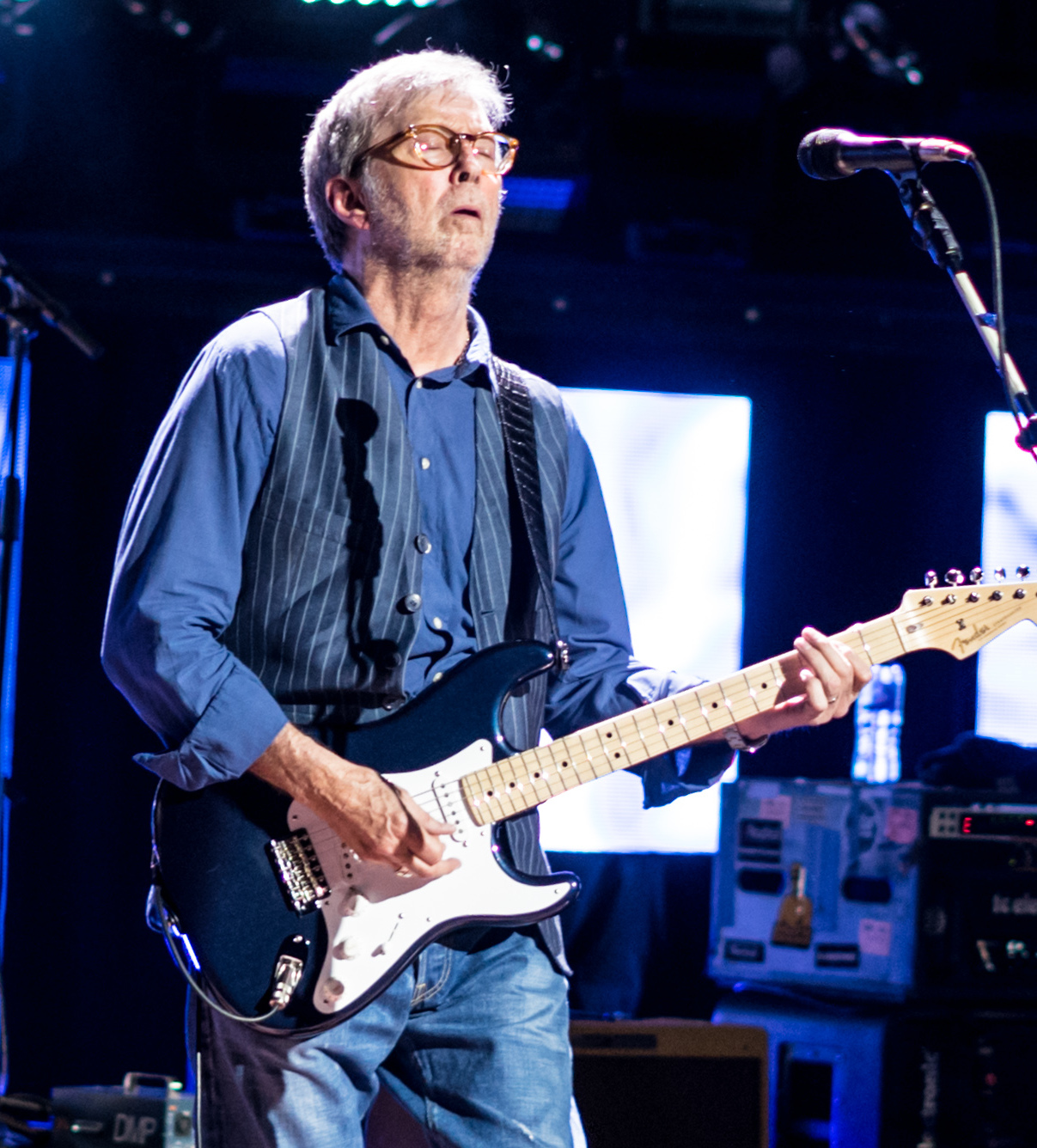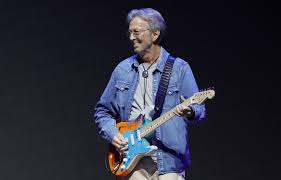Eric Clapton – A Complete Biography
Introduction
Eric Patrick Clapton (born March 30, 1945) is one of the most influential guitarists and singer-songwriters in modern music. Over six decades he has defined British blues-rock with The Yardbirds, John Mayall & the Bluesbreakers, Cream, Blind Faith, and Derek and the Dominos, then sustained a formidable solo career that bridged blues tradition and pop craftsmanship. He is the only three-time inductee to the Rock & Roll Hall of Fame and a multi-GRAMMY winner whose work ranges from the electric fire of “Crossroads” to the intimate ache of Unplugged. His life has been marked by towering artistry, public controversies, addiction and recovery, searing personal loss, and enduring philanthropy.

Childhood
Clapton was born in Ripley, Surrey, England, to a teenage mother and a Canadian soldier who returned to North America before Eric’s birth. He was raised primarily by his grandparents and discovered the guitar in his early teens, briefly attending Kingston College of Art before devoting himself to music. These formative years—absorbing Muddy Waters, B.B. King, and other blues greats—set the foundation for his phrasing, tone, and devotion to the blues idiom.
Youth
By the early 1960s Clapton was a rising figure in London’s burgeoning R&B scene. He joined The Yardbirds in 1963, left when the group pursued a more pop-oriented sound, then became the marquee guitarist with John Mayall & the Bluesbreakers, where his fiery attack made him a cult hero. In 1966 he co-founded Cream with Jack Bruce and Ginger Baker, fusing blues and psychedelia at stadium volumes; their recordings and extended live improvisations made Clapton a global guitar icon. After Cream’s split in 1968 he formed the short-lived supergroup Blind Faith with Steve Winwood, then assembled Derek and the Dominos, whose Layla and Other Assorted Love Songs (1970) became a landmark of rock expression.
Adulthood
Clapton’s 1970s and 1980s were a pendulum of success and struggle. Following heroin addiction and a retreat from public life, he returned with 461 Ocean Boulevard (1974), recasting himself as a singer-songwriter with a relaxed, rootsy approach. He battled alcoholism well into the 1980s, later achieving sobriety and speaking candidly about recovery. In 1998 he founded the Crossroads Centre in Antigua, a residential treatment facility, and later organized the Crossroads Guitar Festival to fund it—an enduring pillar of his public work.
The 1990 helicopter crash that killed Stevie Ray Vaughan—after a concert on a Clapton bill—shook the blues world. A year later, Clapton’s four-year-old son, Conor, died in an accidental fall; Clapton processed that grief in “Tears in Heaven,” performed on MTV Unplugged (1992). At the 35th GRAMMY Awards (1993), he won six awards, including Record and Song of the Year for “Tears in Heaven” and Album of the Year for Unplugged.
Clapton’s public life has also included controversy. In 1976 he delivered a drunken, racist rant in Birmingham praising Enoch Powell; the episode helped catalyze the Rock Against Racism movement and has shadowed his legacy. He later expressed shame for the incident in interviews and his memoir.
In the 2010s–2020s, he revealed he suffers from peripheral neuropathy and age-related ailments affecting performance. During the COVID-19 pandemic he recorded Van Morrison’s anti-lockdown song “Stand and Deliver,” released his own “This Has Gotta Stop,” and said he would not perform at venues requiring vaccination—stances that drew sharp criticism. Even so, he continued to record, tour selectively, and stage high-profile collaborations and tributes.
Major Compositions
Clapton is both a definitive interpreter and a songwriter of lasting standards. Among his most significant compositions:
- “Layla” (with Jim Gordon, Derek and the Dominos, 1970) — A peerless fusion of anguish and virtuosity, inspired by unrequited love; its two-part structure and guitar coda made it a touchstone of rock.
- “Sunshine of Your Love” (with Jack Bruce and Pete Brown, Cream, 1967) — Built around a heavy, modal riff; a pinnacle of late-’60s blues-rock.
- “Bell Bottom Blues” (with Bobby Whitlock, Derek and the Dominos, 1970) — A pleading, melodic ballad that showcases Clapton’s singer-songwriter voice within blues harmony.
- “Badge” (with George Harrison, Cream, 1969) — A concise, harmony-rich pop-rock gem credited to Clapton and Harrison.
- “Presence of the Lord” (Blind Faith, 1969) — A gospel-tinged anthem and Clapton’s first song solely credited to him on a major release.
- “Wonderful Tonight” (1977) — A soft-rock standard written for Pattie Boyd, enduring as a wedding slow-dance staple.
- “Tears in Heaven” (with Will Jennings, 1992) — An intimate memorial to his son, central to Unplugged and honored with multiple GRAMMYs.
(Notable performances that he popularized but did not write include “I Shot the Sheriff” by Bob Marley and “Cocaine” by J.J. Cale.)
Conclusion
Eric Clapton’s career traces a singular arc: the blues-obsessed prodigy who became the archetype of the electric guitar hero; the hit-making solo artist who could pare his music to a single aching note; a public figure navigating addiction, tragedy, controversy, and renewal. His triple Hall-of-Fame status, GRAMMY-studded résumé, and continued influence on guitarists and songwriters confirm a legacy as complex as it is indelible—shaped by the Black American blues tradition he venerated and helped carry to a global audience.

Comments are closed